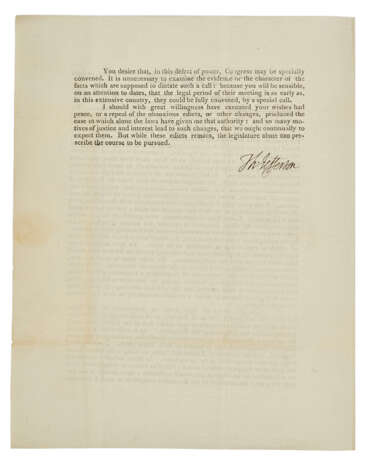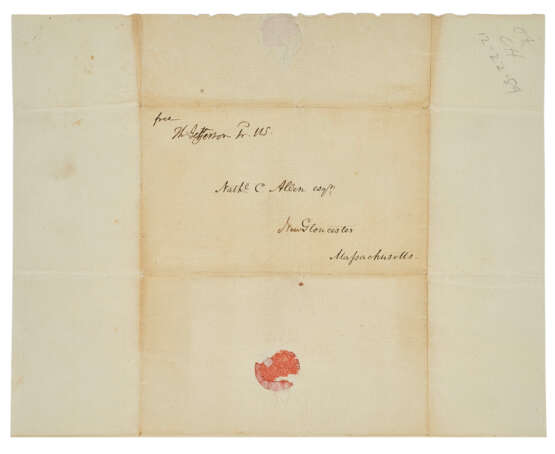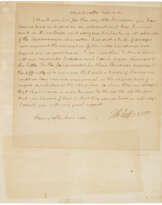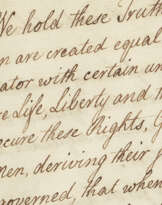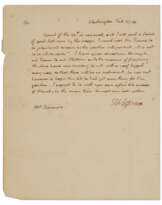ID 1119249
Lot 123 | Defending the Embargo Act of 1807
Estimate value
$ 12 000 – 18 000
Thomas Jefferson, 1808
JEFFERSON, Thomas (1743-1826). Printed circular letter signed ("Th:Jefferson") as President "To the Inhabitants of the Town of Gloucester…", [Washington, 1808].
Two pages, bifolium, 250 x 200mm with three words completed in manuscript. Integral transmittal leaf bearing Jefferson's franking signature ("free Th: Jefferson Pr US.") and addressed to Nathaniel C. Allen in New Gloucester, Massachusetts. Penciled note of authentication by Charles Hamilton on verso ("OK CH 12-22-8"). (Light toning to address panel and minor marginal wear.)
Thomas Jefferson defends the Embargo Act of 1807 which forbade any American ship to sail to foreign ports or any foreign ship to sail to American ports, since both Britain and France routinely ignored the neutrality of American ships during the Napoleonic Wars. Jefferson hoped to establish the principal of American neutrality, but the policy had a devastating effect on American commerce and opposition mounted, especially in New England: "...A division of sentiment was not unexpected. On no question can a perfect unanimity be hoped, or certainly it would have been on that between war and embargo, the only alternatives presented to our choice...[M]anufacturers would of course prefer to war, a state of non-intercourse, so favorable to their rapid growth and prosperity. Agriculture, although sensibly feeling the loss of market for its produce, would find many aggravations in a state of war.... The Embargo, giving time to the belligerent powers [Great Britain and France] to revise their unjust proceedings, and to listen to the dictates of justice, of interest and reputation, which equally urge the correction of their wrongs, has availed our country of the only honorable expedient for avoiding war: and should a repeal of these Edicts supersede the cause for it, our commercial brethren will become sensible that it has consulted their interests, however against their own will...[It is] a fallacious hope that we may, under any pressure, relinquish our equal right of navigating the ocean, go to such ports only as others may prescribe, and there pay the tributary exactions they may impose...While these Edicts are in force, no American can ever consent to a return of peaceable intercourse with those who maintain them..." In 1809, just as he left office, Jefferson signed the Non-Intercourse Act, a compromise which partially lifted the Embargo.
| Artist: | Thomas Jefferson (1743 - 1826) |
|---|---|
| Auction house category: | Letters, documents and manuscripts |
| Artist: | Thomas Jefferson (1743 - 1826) |
|---|---|
| Auction house category: | Letters, documents and manuscripts |
| Address of auction |
CHRISTIE'S 20 Rockefeller Plaza 10020 New York USA | ||||||||||||||
|---|---|---|---|---|---|---|---|---|---|---|---|---|---|---|---|
| Preview |
| ||||||||||||||
| Phone | +1 212 636 2000 | ||||||||||||||
| Fax | +1 212 636 4930 | ||||||||||||||
| Conditions of purchase | Conditions of purchase | ||||||||||||||
| Shipping |
Postal service Courier service pickup by yourself | ||||||||||||||
| Payment methods |
Wire Transfer | ||||||||||||||
| Business hours | Business hours
|

